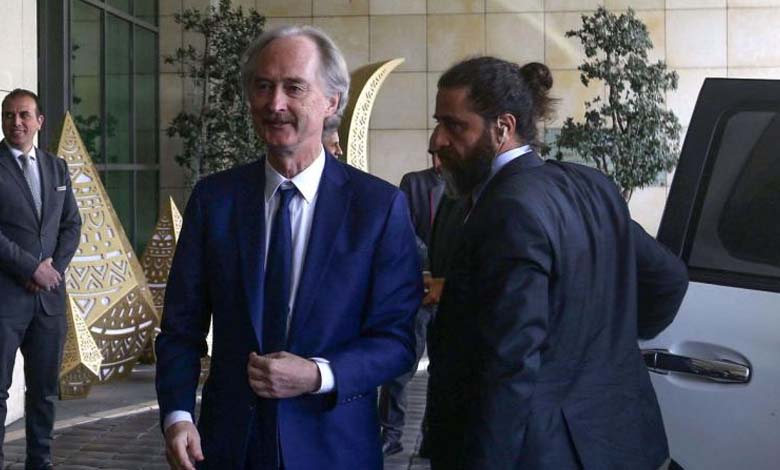Anticipated Saudi Role in Syria through Resolution of Constitutional Committee Crisis
Intensive movements by Pedersen suggest the possibility of consensus on holding Constitutional Committee meetings in Riyadh, considering it a neutral and acceptable party by both Damascus and the opposition

UN Special Envoy for Syria Geir Pedersen discussed developments in Syria during a phone call with Saudi Foreign Minister Faisal bin Farhan on Monday, amid discussions about the possibility of Saudi Arabia hosting meetings of the Syrian Constitutional Committee after Moscow rejected Geneva.
The Saudi Ministry of Foreign Affairs said in a statement that bin Farhan received a phone call from Pedersen, during which they discussed the latest developments regarding the situation in Syria without disclosing further details. Pedersen’s intensive movements indicate the possibility of consensus among all parties to hold meetings in Riyadh, as it can serve as a neutral and acceptable party between Damascus and the opposition, and it possesses assets if it wishes to go beyond its role as a host for negotiations. It could play a significant role in the post-agreement phase, especially in development, reconstruction, investment, and the return of displaced persons.
The Damascus-affiliated newspaper Al-Watan cited diplomatic sources in Damascus describing Pedersen’s proposal of Riyadh as a suggested location for the meetings. It stated that Riyadh emerged as an option after Moscow rejected holding committee meetings in Nairobi, the capital of Kenya, and proposed the Iraqi capital Baghdad, which was rejected by Washington.
The choice of Riyadh, even as a temporary location, reflects a different role that Saudi Arabia could play in the Syrian dossier, after years of supporting the Syrian opposition before deciding in 2023 to change course and open up to Damascus, seeking the return of diplomatic relations with Syrian President Bashar al-Assad.
Statements from the Syrian opposition in the “Syrian Negotiating Committee” emphasize that the important thing is not where the sessions are held but the content of the discussions and the progress made by the Constitutional Committee. This also does not mean choosing cities that represent or are counted against the regime, such as Baghdad or Tehran. It also pointed out that Geneva is the main venue for sessions, but current circumstances necessitate choosing an alternative location, albeit temporary.
Moscow refuses to hold sessions in Geneva, Switzerland, citing Switzerland’s non-neutral stance on its war against Ukraine. Despite Saudi Arabia’s openness towards Damascus in Syria, holding public meetings with Assad, inviting him to visit Riyadh, and the return of diplomatic relations, the Syrian opposition has not taken a firm stance on this issue.
Retired Saudi General and strategic and security studies researcher Abdullah bin Ghanem Al-Qahtani believes that holding the Constitutional Committee meeting in Riyadh is “positive” for two reasons. First, it reflects Saudi Arabia’s openness and establishment of relations with the Damascus government, as well as its relations with the opposition. Second, it already has a history of dealing with both parties and bringing them together, which would be fruitful if successful.
In light of the new relations with Iran present in Syria, this means that holding the Committee meetings in Riyadh is a good thing, but so far, no official approval has also been issued by Saudi Arabia in this regard, nor its official choice. No official stance has been taken by the Saudi government or announcement on accepting to host the work of the Constitutional Committee and its meetings, and it is supposed to have been informed of the approval and desire of the Syrian opposition in this regard, according to statements from the head of the Negotiating Body, Badr Jamous.
UN Special Envoy for Syria Geir Pedersen called on the Syrian government to go to Geneva to participate in the next meeting of the Constitutional Committee, at the end of April, noting that things are “moving in the wrong direction.”
Pedersen told journalists after his meeting with Syrian Foreign Minister Faisal al-Miqdad that he had told him that “as long as there is no agreement between the opposition and the government, we must continue to meet in Geneva, and to develop the Constitutional Committee and work in a way that can give hope to the Syrian people.”
On Tuesday, Qatar called in a statement on the international community and all influential parties to exert more pressure, especially on the Assad regime, to resume meetings of the Syrian Constitutional Committee, warning of the danger of not reaching a political solution.
Abdullah bin Ali Behzad, the second secretary of the Qatar’s permanent delegation to Geneva, said during a dialogue with the International Independent Commission of Inquiry on Syria, within the framework of a session of the Human Rights Council in Geneva: “Pressure must be exerted on Assad to participate in the meetings of the Constitutional Committee in a serious and effective manner, in order to achieve a political solution in line with the Geneva Statement and Security Council Resolution 2254, which realizes the legitimate aspirations of the Syrian people.”












